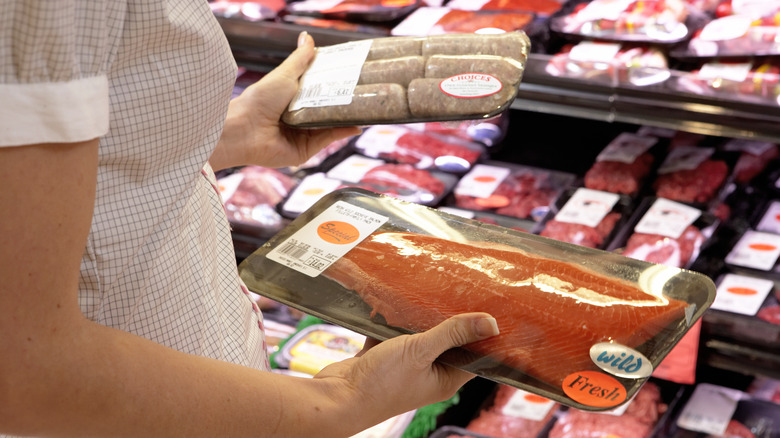Is Fish Considered Meat? And Why It's Such A Difficult Question To Answer
In the United States, the amount of people who adhere to vegetarian diets has recently reached a peak of at least 6%, according to the Vegetarian Resource Group.
Other surveys have suggested that the figure may be in the double digits. Regardless of what the population of full-time plant-based people has swelled to, that number is definitely surpassed by the contingent of folks who limit their meat-eating habits on occasion, and a trip to the grocery store proves that meatless alternatives are undeniably on the rise.
This ever-growing group is not a monolith. There are many reasons a person might eat less meat or abstain from eating animals altogether. There are also innumerable interpretations of what it means to go meatless, and the ethics of these different diets raise a slew of carnivorous considerations. The key question posed to pescatarians is perplexing: Is fish meat? Answering this query raises many ethical concerns, some of which are religious. Ultimately, whether fish is meat is an incredibly complicated question, and largely a matter of personal opinion.
Is fish actually meat?
Your personal ethics may make the idea of eating anything with a face utterly unthinkable. A strict definition of meat encompasses any animal flesh, and as such, includes fish. The fact that fish are unable to live on land and have such an alien anatomy could contribute to our difficulty in discerning whether they're meat. Fish are sequestered to the sea, where we don't often come into contact with them, which likely plays a role in the confusion around the question.
It took until the 2000s for any U.S. state to pass any regulations pertaining to the humane treatment of food animals. Though many states have put animal welfare laws on the books since then, fish still largely remain on the outside of these ethical considerations. Recent research suggests that fish could feel pain, but the specifics of regulating ethical fish consumption is a much more difficult proposition. There are a wildly disparate set of care practices that different fish call for. As such, it's more difficult to regulate fish factory farming.
Cultural considerations to the question
Apart from the ethical debate, many people choose to follow a pescatarian diet, which allows for the consumption of seafood, and many make this decision more for health than morality. A pescatarian diet is more heart-healthy, and is also an excellent way to add more omega-3s into your diet.
However, when religion is a factor, determining the meat status of fish is more complicated. Different religions have different regulations about eating fish. The religious tradition that has the most complicated answer to the question of fish's status as a meat is likely Catholicism. Catholics sometimes abstain from eating meat during Lent. Lent is a 40 day stretch, excluding Sundays, near the beginning of spring. During this time, Catholics avoid eating meat, primarily on Fridays, but fish is still on the menu. In fact, the McDonald's Filet-O-Fish was invented to satisfy the Friday fast food cravings of the original restaurant's largely Catholic consumer base in Cincinnati, Ohio. There is some debate on this issue, as the restriction originated as a form of abstinence; so feasting on fish, to some, violates the spirit of sacrifice. Both religious and secular considerations play a factor in determining whether or not fish should be considered meat, and there is still little consensus on the issue.


